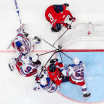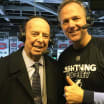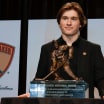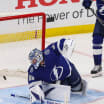Red Wings playoff streak over, still incredible
25-season run may never be seen again in NHL
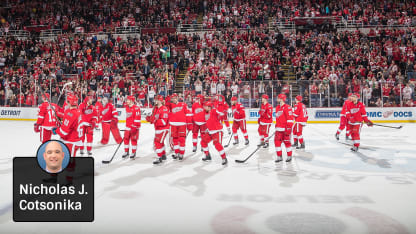
The Red Wings set a standard of excellence while making the playoffs for 25 consecutive seasons. No one wanted to fail to live up to it. Some don't quite know how to handle it because they have never missed the playoffs before.
"Right now it's hard to talk about it," said captain Henrik Zetterberg, who had made the playoffs each season since breaking into the NHL with the Red Wings in 2002-03, "because you're a big reason why it's not continuing."
Zetterberg has been anything but a big reason for it. He has had an excellent season individually. But he's beating himself up anyway. He's the leader, and as he emphasized all season, it wasn't about making the playoffs for the sake of the streak. It was about competing for the Cup.
"It [stinks] that there's not going to be playoff hockey," said assistant general manager Kris Draper, who made the playoffs each season when he played for the Red Wings from 1993-94 through 2010-11. "I know when I was a player, March Madness, the Masters and Red Wings playoff hockey, that was the favorite, favorite time of year for me."
Now it's as if "One Shining Moment" won't play at the end of the NCAA tournament or the azaleas won't bloom at Augusta. The octopi won't fly onto the ice at Joe Louis Arena after the regular-season finale against the New Jersey Devils on April 9, their eight legs representing the eight wins once needed to win the Cup.
But playoffs were not a rite of spring in Detroit. They only seemed to be. This was inevitable, long overdue, and now that it has finally happened, keep it in perspective and appreciate how amazing the streak was. The NHL might never see anything like it again.
"No one's ever happy when you don't make the playoffs," said senior vice president Jimmy Devellano, who has been with the Red Wings since the late Mike Ilitch bought the team in 1982. "But as I told our people, we've got a lot of company. Sixteen make it. Fourteen don't make it. We've given the fans wonderful hockey for a quarter of a century.
"It had to happen. It had to happen."
* * * * *
Think of how much time has passed since the Red Wings last missed the playoffs. You're reading this on the Internet, which didn't exist.
The 1989-90 Red Wings roster included Jimmy Carson, Bernie Federko, Gerard Gallant, Adam Graves, Petr Klima, Jim Nill, Bob Probert and Borje Salming. Steve Yzerman, the captain, was 24. Colin Campbell was an assistant coach.
The Red Wings went 28-38-14, and that last number was for ties, not overtime/shootout losses. They had 70 points, last in the Norris Division, second to last in the Campbell Conference.
No player in the NHL today was in the NHL then, not even Jaromir Jagr. Nine of the franchises in the NHL today weren't in the NHL, 10 if you include the Vegas Golden Knights, who begin play next season.
Coach Jeff Blashill was 16 when the playoffs began without the Red Wings in April 1990. Fifteen players who have appeared in a game for the Red Wings this season hadn't been born.
Now think of how much the Red Wings accomplished over the next 25 seasons, a quarter of the Centennial the NHL is celebrating this season.
They won the Stanley Cup four times, tied with the Pittsburgh Penguins for most in that span, and came within a game of winning it a fifth when they lost Game 7 of the Final to the Penguins in 2009. They went to the Final six times.
They won the Presidents' Trophy six times, three times more than any other team in that span. They won 1,133 regular-season games, 104 more than any other team, and earned 2,536 points, 209 more than any other team.
They set records for wins in a season (62 in 1995-96), road wins in a season (31 in 2005-06), consecutive road wins (12 in 2005-06) and consecutive home wins (23 in 2011-12), and they tied the record for home wins in a season (36 in 1995-96).
For 21 seasons, they didn't come close to missing the playoffs. They finished in the top four in their conference 18 times and had a cushion of at least a dozen points the other three times. It wasn't until the past few seasons that they had to fight to make the playoffs.
"Some of these kids, that's all they know," Draper said, looking into the stands at the Joe. "Some of these kids have grown up, and all they've known is Red Wings playoff hockey and success and Stanley Cups, streaks, and it's amazing to think of that."
The Red Wings streak was not the longest in NHL history. The Boston Bruins made the playoffs 29 straight seasons from 1967-68 through 1995-96. The Chicago Blackhawks made the playoffs for 28 straight from 1969-70 through 1996-97. The St. Louis Blues also made the playoffs for 25 straight from 1979-80 through 2003-04.
But the Red Wings streak might have been the most impressive. It was really two streaks in one.
The foundation of the first was Yzerman, Sergei Fedorov and Nicklas Lidstrom, whom the Red Wings surrounded with a strong supporting cast, many of whom ended up in the Hockey Hall of Fame, and Scotty Bowman, the greatest coach in hockey history.
The foundation of the second was Lidstrom, Pavel Datsyuk and Zetterberg. Datsyuk, selected in the sixth round (No. 171) of the 1998 NHL Draft, arrived in 2001-02. Zetterberg, selected in the seventh round (No. 210) of the 1999 draft, arrived the next season, giving the Red Wings two elite centers without high draft picks.
Bowman retired in 2002. Fedorov left as a free agent in 2003. Yzerman retired in 2006.
"Right when everyone thought we were going to slip, when Sergei moves on, Stevie's getting to the end of the road, next thing you know, Pav and Z come in," Draper said. "Unbelievable. That put us on another 10-year run."
That, and savvy management. The NHL introduced the salary cap in 2005-06. The Red Wings cut their payroll in half to fit under the $39 million limit and hired coach Mike Babcock.
"You didn't know if you could keep the thing going," Babcock said.
But the Red Wings did. General manager Ken Holland adjusted to the new system and kept turning over the roster. Only five players were part of each of the 1997, 1998, 2002 and 2008 Stanley Cup teams: Draper, Lidstrom, Tomas Holmstrom, Kirk Maltby and Darren McCarty.
"That's a credit to Kenny Holland," Draper said. "I would say the most significant years of that streak are from when the salary cap came in."
Lidstrom retired in 2012, and still the Red Wings kept making the playoffs. Babcock left in 2015, and still the Red Wings made it another season. Datsyuk left, and, well, finally, this is it.
Until now, the Red Wings were the only team to make the playoffs each season of the salary-cap era. The Penguins now have the longest streak at 11 seasons, including this one. The Blackhawks are next at nine.
Can the Penguins surpass the Red Wings streak? Fifteen years from now, Sidney Crosby will be 44. Evgeni Malkin will be 45.
"It catches up to you, and it's caught up to us," Devellano said. "Pittsburgh has to do it for another 15 years. Crosby won't be there. Malkin won't be there. So who's going to replace them where they draft? I don't think they can do it. I don't wish that on them, but I just don't see it happening again."
It's hard to imagine.
"I don't know," Penguins general manager Jim Rutherford said. "I mean, there's a lot of parity in the League now with the cap. It's hard making the playoffs one year, let alone several years in a row. So it's an unknown whether that can be done."
What about the Blackhawks? Seventeen years from now, Jonathan Toews and Patrick Kane each will be 45.
"I don't know that you'll ever see this again," Blackhawks GM Stan Bowman said. "I don't know that you'll ever see a team be this elite of a franchise for that many years. That's what we're striving to do, and we're not even a third of the way there, really, for the number of years that they've been able to do it."
Even if the Penguins and Blackhawks can replace their core players without drafting high, finding gems like free agent Artemi Panarin, they will have to deal with the cap.
"To me, the bigger challenge is that you can't keep your players anymore," Bowman said. "You don't always get them through the draft. We got Panarin as a free agent, who's the equivalent of a top-five pick talentwise. So it's great that you have them, but then all of a sudden, it's almost like you've got too many good players. You can't pay them all.
"The challenge is to try to keep that going. I'm not giving up. We're striving to be a team that's an elite team for years and years and years. It's just certainly hard to do."
* * * * *
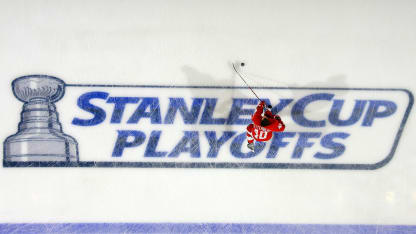
© Dave Reginek/Getty Images
This feels like the end of an era in Detroit, and it is. The great Gordie Howe died June 10. Ilitch died Feb. 10. Now the streak is over, and Joe Louis Arena is closing.
"It's an emotional year for a lot of reasons," Holland said.
But the end of the streak is not the end of the Red Wings. The streak was a product of what the Red Wings built, which is why they have been fighting so hard to maintain their culture. They know it will be hard to land a generational talent without selecting at or near the top of the draft, but they do not want to accept losing and go into a full rebuild because that can take years and there are no guarantees.
"I don't believe that you can just plan to be bad for a period of time and wake up on the other side and be good," Holland said. "You've got to be bad in the right year, and then you've got to win the lottery.
"And so I think you want to compete. We want to try to compete for a playoff spot. Our goal as we head into the offseason is to try to put a team together to try to compete for a playoff spot."
The Red Wings have young talent in Andreas Athanasiou, Dylan Larkin and Anthony Mantha. After 25 years of drafting low -- their average first pick was No. 38 because of their success and trades -- they will have their first top 10 pick since 1990 and seven picks in the top 100. They will have Little Caesars Arena, a spectacular venue with an attached practice rink that could help attract free agents.
They need their young players to take another step. They need to find more talent in the draft and develop it. They need to make shrewd moves under the cap.
"As an organization from top to bottom, we've got to dig in and get back at 'er," Draper said. "We've got to stay the course."
Spring just isn't the same in Detroit without the Stanley Cup Playoffs.
NHL.com correspondent Corey Long contributed to this report.




